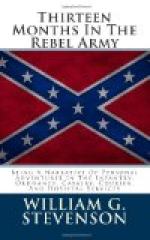A part of the original plan of battle was to have a space several hundred yards wide between Breckenridge’s left and Hardee’s right, and thus invite Grant’s men into a trap. They refusing to be entrapped, and keeping their front unbroken, Breckenridge sent me to General Johnson for new instructions. When I had come within about ten rods of Johnson’s staff, a shell burst in the air about equidistant from myself and the staff. The missiles of death seemed to fill the air in every direction, and almost before the fragments had found their resting-place, I reined up my horse and saluted. General Johnson, who was in front of his staff, had turned away his horse and was leaning a little forward, pressing his right knee against the saddle. In a moment, and before the dispatch was delivered, the staff discovered that their leader was wounded, and hastened to his assistance. A piece of the shell, whose fragments had flown so thick around me as I came up, had struck his thigh half way between his hip and knee, and cut a wide path through, severing the femoral artery. Had he been instantly taken from his horse and a tourniquet applied, he might perhaps have been saved. When reproached by Governor Harris, chief of staff and his brother-in-law, for concealing his wound while his life-blood was ebbing away, he replied, with true nobility of soul, “My life is nothing to the success of this charge; had I exclaimed I was wounded when the troops were passing, it might have created a panic and defeat.” In ten minutes after he was lifted from his horse he ceased to breathe. Thus died one of the bravest generals in the Rebel army. My dispatch was taken by Colonel Wickliffe and handed to Harris, who directed me to take it to General Beauregard. When he had read it, he asked—
“Why did you not take this to General Johnson?”
“I did, sir.”
“Did he tell you to bring it to me?”
“General Johnson is dead, sir.”
“How do you know?”
“I saw him die ten minutes ago?”
“How was he killed?”
I told him. He then dictated two dispatches, one to Governor Harris and one to General Breckenridge, telling them to conceal the death of Johnson, and bidding me not to speak of it to any one. So far as the report of his death was circulated the officers denied it, some affirming that it was Governor Johnson of Kentucky who was killed, others admitting that General A.S. Johnson was slightly wounded. The army knew not of his death till they reached Corinth.
When I returned to General Breckenridge’s staff they had advanced half a mile, and were furiously engaged within half-musket range with both small-arms and artillery. About noon General Bowen’s brigade—Breckenridge’s left—was forced to fall back for ammunition and to reform, their place being supplied by two regiments of Louisiana troops. Here, from two to four P.M., was the hardest fighting in the battle. Breckenridge’s own




